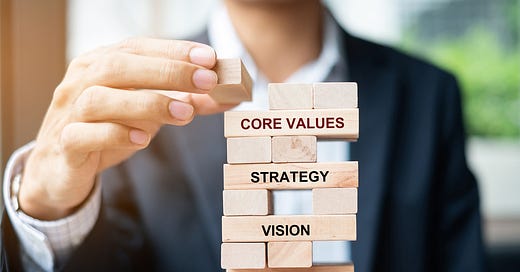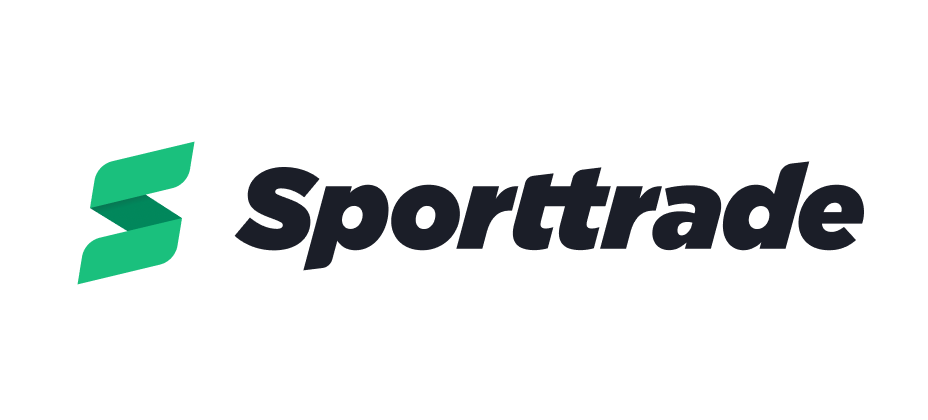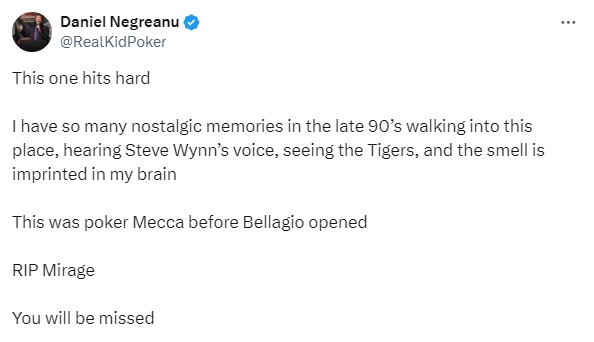Can NCLGS Model Legislation Reverse iCasino's Fortunes?
NCLGS "model online gambling legislation" is beginning to come into focus, but how will legislatures view the recommendations?
The Bulletin Board
VIEWS: Can NCLGS’ “model legislation” breakthrough and reverse the negative online casino trend?
LEGISLATIVE and REGULATORY UPDATES: Bally’s Chicago casino back on track and mobile betting in Nebraska?
NEWS: New York’s hefty sports betting tax rate is here to stay.
VIEWS: State lotteries think sports betting is eating into their sales and convincing them to authorize online lottery sales.
AROUND the WATERCOOLER: The End of an Era: The Mirage Closes its Doors
STRAY THOUGHTS: Poker’s missed opportunity.
SPONSOR’S MESSAGE - Sporttrade was borne out of the belief that the golden age of sports betting has yet to come. Combining proprietary technology, thoughtful design, and capital markets expertise, our platform endeavors to modernize sports betting for a more equitable, responsible, and accessible future.
Sporttrade’s newest feature, The Tape, prints all trades made on the app in real-time.
NCLGS Model Online Gambling Legislation Short on Details (for now)
The entire gambling universe has been griping about bad online gambling policies for years. The complaints run the gamut and come from every direction: backbreaking financial burdens, closed markets with little competition, a lack of funding for problem gambling, toothless responsible gaming mandates, and missing protections for bettors.
Since his ascension to the helm of the National Council of Legislators from Gaming States, West Virginia Del. Shawn Fluharty has made “model legislation” a top priority.
At last week’s NCLGS Conference in Pittsburgh, the bones of the organization’s model legislation were discussed. The group is creating model legislation and will also provide model rules for regulators to separate legislative mandates from regulations.
According to Play USA’s Matthew Kredell, a first draft is expected to be floated in the next couple of weeks.
“After a comment period of at least 30 days, a panel of about 25 experts that includes regulators, academics, and industry representatives will adopt a bill to recommend to the NCLGS iGaming Committee,” Kredell reports.
At the Winter Meeting in New Orleans, “the NCLGS iGaming Committee will hold a public meeting to discuss and pass the model legislation.” The finished product isn’t expected until the 2025 Summer Meeting, but later changes would be technical.
According to Casino Reports, NCLGS is recommending a tax rate between 15% and 25% and provisions covering key topics such as revenue generation, responsible gambling controls, advertising and promotion guidelines, data sharing with the research sector, and other aspects addressed to varying degrees by legislation in the seven states that have already legalized iGaming.”
The unique aspect is a focus on collaboration with universities, something Fluharty fought for in West Virginia.
The big question is whether states will consider the NCLGS recommendations, like the 15-25% tax rate, as being too influenced by operators.
Tax rates in online casino states tend to skew higher (and have been trending up):
New Jersey - 17.5%
Delaware - 52% (slots)/20% (table games)
Pennsylvania - 54% (slots)/16% (table games)
Michigan - 24%
Connecticut - 18%
West Virginia - 15%
Rhode Island - 62.45% (slots)/16.5% (table games)
“I think that on the iGaming side, it’s not that tax-sensitive. People hate when I say that, but generally, that’s true,” Light & Wonder’s Howard Glaser said. “The best tax rate is a tax rate that gets you to pass legal iGaming in the state.”
Maryland State Sen. Ron Watson suggested a marketing campaign extolling the benefits of online gaming to counteract cannibalization concerns, which sunk Maryland’s efforts this year.
As I’ve been reporting, the real roadblock is stakeholder divisions:
“These differences of opinion aren’t going to disappear as regional casino operators continue to fear the impact of online gambling, and no amount of cajoling is going to change that.
“As I recently wrote, “Most land-based markets are mature, with established pecking orders and fragile ecosystems. When you introduce something as significant as online casinos, the ecosystem and pecking order will change. Not everyone will benefit, and many casinos fear they will be on the losing end.”
Further, some casino operators that have invested heavily in their online gambling divisions are chomping at the bit for legalization. Others who are much further behind are against it, at least until they can catch up.
Legislative and Regulatory Updates: Bally’s Chicago Casino Back on Track; Mobile Betting in Nebraska?
Bally’s Chicago casino on track to open in September 2026: After securing $940 million in financing from Gaming and Leisure Properties, Bally’s Chicago casino is back on track, with plans including a 500-room hotel. With the funding, the casino will be built in a single phase - previously in doubt. “With keys to the property in hand, the new financing secured, a site plan that exceeds the original, and demolition set to start this summer, let there be no doubt that Bally’s Chicago Casino and Hotel will soon rise up along the Chicago River,” George Papanier, president of Bally’s Corp said.
Mobile betting ballot initiative coming to Nebraska?: Nebraska lawmakers are expected to discuss an amendment authorizing online sports betting on the November ballot during an upcoming special session on July 25. Per local reporting, “Despite voicing opposition to online sports betting in the past, Gov. Jim Pillen reportedly has expressed support for an initiative to legalize online sports betting in order to generate revenue that would help him reach his stated goal of reducing property taxes in the state by 50%.”
Sponsors Message: Kero is a premier micro-betting provider, powering more than 150 operators across the globe.
Our extensive coverage of fast markets in Football, Basketball, Baseball, and Soccer is a proven method for increasing in-play handle and hold.
Talk to us about how we utilize algorithmic recommendation to power highly contextual micro markets for the ultimate in-play experience.
New York Unlikely to Lower Sports Betting Tax Rate
Sports betting operators were willing to agree to almost anything, including a 51% tax rate, to get their foot in the door in New York. One reason was their steadfast belief in their lobbyists, who they believed could convince the legislature to reduce the rate down the road — just as they thought they could steamroll into California or prevent Illinois from raising its tax rate.
So far, their efforts to lower the New York tax rate have been largely ignored, and this is unlikely to change.
Troy Mackey, the coordinator of the New York Assembly’s Racing & Wagering Committee, told the National Council of Legislators from Gaming States that the state has no intention of easing the tax rate on mobile betting operators.
“New York is doing extremely well and it’s one of those things that you cannot go back now, unfortunately, to reduce the tax rate,” Mackey said. “We tried to revisit that and there was no justification, well, you couldn’t justify taking away money from education and giving it to a corporation. That is the argument we’ve been up against.”
Quick Hitter: Sports Betting Spurs on Online Lottery?
The 350-page report from the Study Commission on the Future of Gaming in Ohio contained a very interesting nugget unearthed by SBC Americas Jessica Welman:
“State lotteries in other states have voiced concerns about online casinos impacting businesses, but the Ohio Lottery told the committee that sports betting is negatively impacting the business. In its testimony, the lottery said that Keno sales were, by their estimates, down 7% since the launch of sports betting.”
A similar sentiment was raised in Massachusetts, which authorized online lottery sales through its budget soon after, in what seems like more than a coincidence. If these results are seen across the board, it could lead to more states authorizing online lottery sales.
As I reported in April, Massachusetts Lottery Director Mark William Bracken “believes mobile sports betting has something to do with the decline… and wants to compete on equal footing and is once again making the case that it should be allowed to offer a full suite of online products.
Of course, online lotteries, especially those with instant win games, will become yet another formidable obstacle to online casino legalization.
SPONSOR’S MESSAGE - SUBSCRIBE NOW to Zero Latency, the new podcast from Eilers & Krejcik Gaming that provides unparalleled insight into the U.S. online gambling industry through interviews with industry insiders and analysis from EKG experts.
Around the Watercooler
Social media conversations, rumors, and gossip.
The Mirage has closed its doors.
The story has been widely reported, so instead of rehashing it, below are some of the best statements I’ve seen on The Mirage.
“Today is about celebrating the legacy of the amazing Mirage Resort Casino Hotel,” Hard Rock CEO Jim Allen said. “It is unique in our industry. Casinos were casinos and that’s what creates the drive for return on investment. But this is a true destination. Closing it today is a very humbling experience. We have a very heavy heart over people (including employees) moving to other places on the Strip.”
Alan Feldman, a fellow at the UNLV International Gaming Institute who previously worked for MGM Resorts and was a recent inductee into the AGA Hall of Fame, talked about the constant change in Las Vegas:
“Las Vegas is the city that benefits from change like no other destination in the world,” Feldman said. “The Dunes gave way to Bellagio. The Boardwalk to CityCenter. The Sands became the Venetian. The Hacienda and Desert Inn became the Wynn and Encore. The Marina became the MGM Grand, and on and on. The extraordinary momentum of our growth and prosperity relies on our willingness to change and empower the many creative minds to propel this city forward in an unimaginable fashion. The impact (of The Mirage) and its legacy will last forever. I know today is pinged with some sadness and bittersweet feelings, but it is the many extraordinary moments and experiences that we have all had that we will retain for the rest of our lives.”
In an “homage to Lady Mirage,” Steve Wynn, the visionary who created The Mirage, put into perspective how vital of a property it was:
“The notion of offspring turned out to be real as well. In the prior 16 years, no completely new hotel had been built in Las Vegas. Perhaps the result of the spread of gambling to Atlantic City and the beginning of widespread Indian gaming in California. But other than a few additional rooms being built at existing hotels such as the Golden Nugget, nothing was built from scratch. However, in the next decade following the 1989 arrival of Mirage, we rushed into a virtual doubling of the town’s capacity and became the fastest growing city in America. To call The Mirage a catalyst would be an understatement.”
As a poker player in the 1990s and 2000s, I have similar feelings to Daniel Negreanu. The Mirage poker room was my first stop on my first trip to Las Vegas and one of the only properties I saved a poker chip from:
Stray Thoughts
The World Series of Poker Main Event was a record-setter and nearly became a game-changer had Kristen Foxen made the final table — Foxen finished in 13th place, narrowly missing becoming the first woman to make the final table since Barbara Enright in 1995.
The Main Event received considerable publicity while it was taking place. Still, outside of some spirited debate about solvers on the rail, the world has moved on to the next story, and the 2024 WSOP Main Event is largely forgotten.
Foxen’s deeper run could have put poker back into mainstream consciousness and perhaps sparked a conversation about why online poker hasn’t been legalized in most states, which would be interesting juxtaposed against sports betting.







